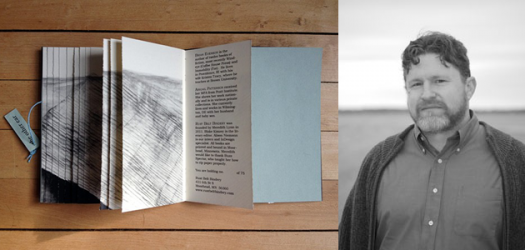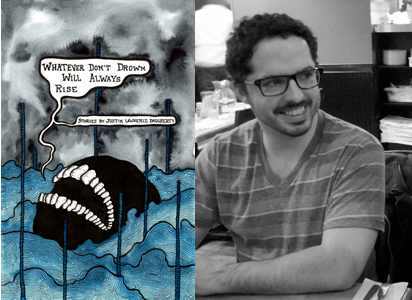

Brian Evenson’s work has won the American Library Association’s award for Best Horror Novel, an IHG Award, three O. Henry Prizes, an NEA fellowship, a finalist spot for an Edgar Award, has been lauded by Time Out New York and has been translated into French, Italian, Spanish, Japanese and Slovenian. He lives and works in Providence, Rhode Island, where until recently he directed Brown University’s Literary Arts Department.
Monkeybicycle: The Other Ear is stunningly produced by the good folks at Rust Belt Bindery, featuring diminishing rough cut pages, original artwork, and beautifully detailed flourishes. How does it feel to have a story like this cared for and loved in such a way?
Brian Evenson: It feels great. I always like it when people read my work and enjoy it, but things like this, where someone takes a story of yours and spends a lot of time and care and energy and effort making it into an aesthetic object, and does so in a way that translates aspects of the story into the production of the book itself, I find very satisfying. And it also, I think, ends up teaching me something about the work itself, about what it’s suggesting visually and artistically. I love having my work made into artists’ books.
Mb: Some of your previous work has been treated equally diligently, like your novella Baby Leg which Tyrant Books made as a limited-edition hardback that you signed, numbered, and handled with our own fake-blood-covered hands. What is it about your writing that makes indie publishers and specialty presses want to take it on with such intensity and creativity?
BE: Yes, there’s Baby Leg, which has a gilt, stamped cover, interior artwork, and is in a large square format. Probably the most significant thing about it, as you point out, is that it seems to be covered with bloody handprints and that the book is signed not only with my signature but with my thumbprint (which I guess makes it possible for you to commit crimes and me to be blamed). There’s also The Drownable Species which is a very high end and gorgeous artist book in a variable edition of 40 (you can see three different copies here). There’s a limited edition of Last Days (a run of 75), which is made distinctive by my having handwritten lines from the book onto the dustjacket in order (i.e. the first book holds the first lines of the book, the last book holds the last lines, etc.). Then there are several broadsides of stories or parts of stories (“Altmann’s Tongue”, “Windeye”, “South of the Beast”), as well as a story that is made to be folded into a box (“Invisible Box”). It’s something I love to give permission to people to do. I don’t know for sure what it is about my writing that makes people want to do it, but I’m glad they do. I guess I think that it’s an intense enough process that people only want to do it if they genuinely connect to the work, so it does make me feel that there are people out there who value what I’m doing, and who want to share how they feel about it with others. I’m really flattered by it.
Mb: The surgeon gave him a steady look. “One side of your body and one side of your face. You still look human if that’s what you’re worried about. Your left ear had been torn off but the man who brought you in saw it and brought it back as well. We were able to sew it back on.”
“My ear?” he said. He reached up and was surprised by what he felt there.
The surgeon nodded.
“But I didn’t have that ear,” István said, still feeling the side of his head. “I lost that ear months ago.”
Dismemberment and disfigurements are also featured in Baby Leg and your novel Final Days, among others. Why is this particular component a focal point of so many different pieces of your writing?
BE: I don’t know. I’m sure Freud would have suggestions, but I’m not certain I want to hear them. I guess on a theoretical level part of it is that I’m very interested in perception and in the idea of embodied perception—that we end up making sense of the world from a very specific physical and mental position. As a result, I’m also interested in what happens when our embodiment changes, when the body we use to interact with the world is modified or disfigured. That fascinates me, and strikes me as a good entry into understanding other, subtler shifts in perception.
Mb: Another seeming staple of your short fiction, including in The Other Ear, is the intentionally open-ended conclusion, giving the reader enough to thrive on but not enough to answer all the questions opened by the text. What draws you to this type of finish so often in your writing?
BE: As a reader I like stories that make me continue to think after I’ve finished reading them, stories that live inside me and continue to be alive and moving after I’ve closed the book. I think the open-ended conclusion encourages that. What you say about “giving the reader enough to thrive on” strikes me as capturing it exactly.
Mb: On a different note, we see you just welcomed a new child into the world (congratulations!). Any predictions on how this may affect your writing, both in the concrete elements (time, energy, etc.) and the less tangible one (creativity, subject matter, etc.)?
BE: It’s definitely having a big effect on my time and energy, at least at the moment, though that might fade. I think in a less concrete way it has also had a big effect in terms of reorienting my sense of the world. It’s amazing to watch a child change and develop—especially in the first few months since the changes are so dramatic (as I’m writing this my son is 10 weeks old). If you spend enough time around your child and pay close attention and know something about how their development progresses, you experience second-hand these amazing moments of shift—moments when, for instance, they suddenly begin to differentiate objects, when voices start to mean something, and so on. It’s absolutely amazing. I went through that with my other two children (who are much older now) but I was less aware of it, I think, and in any case had forgotten it. It’s great to experience it again.
Purchase a copy of The Other Ear here, & read more from / about Brian Evenson here.
J. A. Tyler’s novel The Zoo, a Going is forthcoming from Dzanc Books. He also runs Mud Luscious Press.


